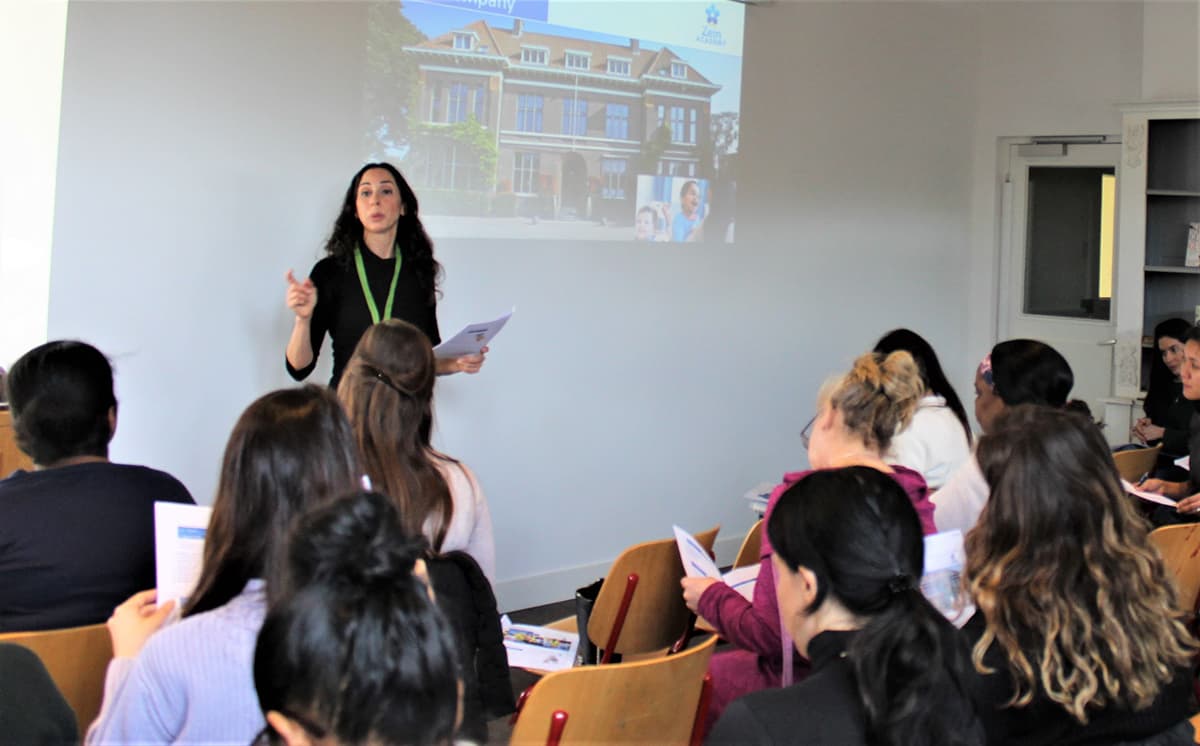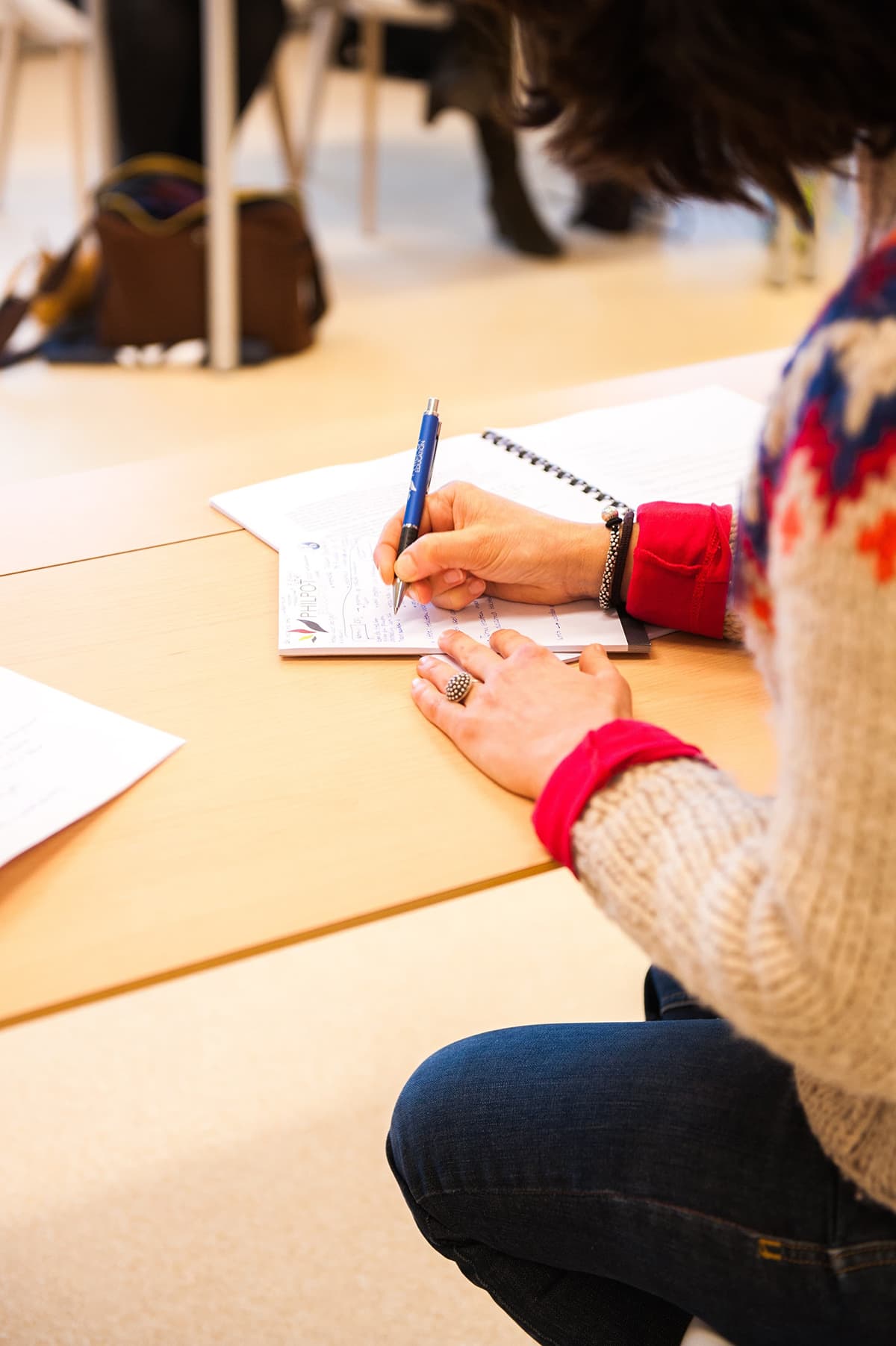
Training & Lectures
As an experienced speaker, Robbie provides a wide variety of lectures and training. Below we provide an overview of the most requested topics. Our extensive experience working in and with educational institutions, families, international organisations and municipalities means we can tailor the content of both flexible training sessions and structured lectures to the needs of the audience – as well as develop tailor-made sessions.

Zein Educational Consultancy Lectures and Trainings
Lectures can be booked for larger audiences by early years centres, schools, universities, international employers and municipalities wanting their community (educators/educators to be, staff, parents) to benefit from new insights and guidance relating to an internationally mobile lifestyle, intentional teaching of social-emotional competencies, positive child behaviour guidance methods or any of the other topics available. For smaller groups, the topics are covered in an interactive training format, allowing for a more personalised and fluid approach to the session.
Robbie will travel to provide live, in-person lectures and training in Europe and the Middle-East and will provide suitable online alternatives as circumstances require.
During this lecture, Robbie discusses what it is like to grow up across different cultures. How spending a significant period of our childhood years in a culture outside that of our parents’ original culture(s) impacts Third Culture Kids (TCK’s). What unique personality traits do these children share and what challenges and benefits do they face as they grow up – and what opportunities are in their future?
For educators: What happens when educators do not recognise the hidden diversities of international children in their care? Guidelines are offered to help teachers recognise and better understand the needs, backgrounds, and identities of expatriate families as well as how to work through and successfully deal with the many challenges families may face in a fast-changing, foreign environment. The sooner the unique identities of these children are acknowledged and addressed, the sooner children will start to feel valued within their new environment. Examples, activities, and ideas to integrate into the curriculum are offered.
A home away from home is a place where children and parents from across the world feel welcome and supported. In the first part of this lecture, the benefits of a homely environment during childhood are explained and guidelines are provided on how educators can create a physical and psychological home for the children in their care.
The second part of this lecture covers how to recognise symptoms of stress in children of different ages as well as methods to help children cope and release their feelings of anxiety. It is not always easy to recognise stress in children; different children display different symptoms and require different support methods. In this session, step-by-step guidance is provided on how to recognise symptoms quickly, how to identify the cause, and how to help the child cope with and release their feelings of anxiety. By understanding the importance of stress release and knowing how to apply different coping methods, you will be able to turn the day around for the child. A particular focus is placed on supporting hypersensitive children and the (stress) implications of moving from country to country.
Developed by Robbie Zein, the Choices system is a balanced, child-centred guidance philosophy that addresses the developmental needs and abilities of children in a positive manner. This system can be used by parents and educators to encourage and reinforce positive behaviours as well as to decrease the recurrence of negative behaviours – without using punishment.
So what is a Choice? A Choice is the re-enforcer/consequence of positive behaviour. How is a Choice gained? What can a Choice be spent on? How is a Choice lost? How can you ensure the child still feels like you are on their side when a Choice is lost? With over 20 years of experience in using the system, we share many different practical tips and real-life examples of how the system can be used to develop confidence and trust with children, stop socially unaccepted behaviour, solve conflicts with collaboration, increase general reasoning and decision-making abilities and improve communication. All in a positive manner. [LINK] Click here to purchase a copy of the Choices book.
This session starts with the question: What are the happiest and worst encounters you have had? How did these encounters impact you? How strong are your memories of these encounters today? Attendees will learn to analyse encounters and determine how our perception of these encounters may have been influenced by our past experiences, education, values, culture, preconceived notions or circumstances.
Effective cross-cultural communication is the process of recognising differences and similarities among cultures. To create an understanding of how people from different cultures speak, communicate and perceive the world around them – examples of differences and similarities between various countries and cultures are explored. What is considered polite in your culture but considered unacceptable in others? Is someone who hardly looks into your eyes being rude or polite?
How do you greet and introduce yourself? How do you engage in small talk? How do you know what you can expect from the other party in difficult situations? In the last part of the training, Robbie provides a simple four-step process that promotes effective communication. Educators, parents and staff of international organisations practice this process by acting out and discussing real-life examples.
Social-emotional growth is a critical area for all children but it is even more so for children growing up across cultures. To manage our emotions, build healthy relationships, resolve conflicts and feel empathy this training discusses the importance of intentional teaching of social-emotional competencies within the educational environment. Competencies that will help children succeed in their friendships, school life, home life, future careers and as model citizens and leaders in tomorrow’s world.
All areas of social-emotional development are covered and guidance on how to actively promote these competencies by creating opportunities for children to solve problems, develop social skills, separate emotions from actions and more are provided. Furthermore, one learns how to minimise anxiety and ensure children feel happy, relaxed and safe. Once the adult learns to see the world from the child’s perspective – in a situation such as tidying up, for example – they start to understand and predict the (undesirable) behaviour of the child. As a result, frustration decreases and a consistent nurturing relationship that promotes healthy social-emotional outcomes in young children can develop.
In this training, Robbie provides insight into what may lay behind the shy, fussy and withdrawn behaviours of children. What happens when parents or educators fail to recognise highly sensitive children in their care? In addition to a better understanding of how highly sensitive children experience their surroundings, teachers receive tips and practical advice on how to provide positive guidance and support to these children – particularly within a group environment. How to increase self-esteem and how to avoid shaming. How to give positive discipline. And for infants, how to soothe and avoid overstimulation.
The impact we can have as parents and educators of highly-sensitive children goes beyond being able to support them at home, day care or school. This training session enables parents and educators to prepare the child for life beyond their childhood years. Robbie discusses how to help children develop coping mechanisms that will allow them to adjust to change and different environments.
It is important to consider diversity and ethics whilst working within an international environment. During this training, Robbie discusses the benefits of diversity and how to create an inclusive environment through day-to-day interactions with colleagues, parents and children and others.
What are the benefits of having different cultures, races, genders, ethnicities, beliefs, experiences and ideas within a shared environment? What is the role of these aspects in the development of our values and our ethical behaviour? What is common perspective? Through real-world examples, Robbie helps uncover (unconscious) biases that humans naturally develop and provides tips and techniques on how to manage these. Once we learn to understand the differences between ourselves and others, we will start to celebrate equality and diversity between cultures. Being different is beautiful, our differences make us who we are!
During this session, Robbie provides insights, tips and resources to parents and educators looking to support the emotional development of children. Examples are provided to explain how advice for two children displaying the same behaviours may differ due to their family set-up or circumstances. Common behavioural issues – such as biting, bullying, picky-eaters, ADHD etc. – and how to resolve them are also discussed. Finally, guidance is provided on how a teacher or parent can minimise behavioural issues through the set-up of the environment or adjustments to the daily routines.
Every person is unique. We function differently based on our personalities and capacities. In order to empower ourselves both within and outside of the workplace, this interactive training helps us identify our personal strengths and weaknesses. By increasing our self-awareness, we can start leveraging our strengths – our value to the world – and manage our weaknesses.
Through open discussion, the group will develop techniques for approaching a glitch in leadership or general performance. How do you evaluate your own actions and behaviours? How do make a mistake a positive part of your growth? By including leadership theories such as control versus trust in the discussion, we will learn to better understand why we work or behave in a certain way. The group also explores how to become accustomed to change – a basic rule in life. All to find and create joy in the workplace.
This training is about optimising the physical and mental wellbeing. What are the key factors influencing our wellbeing? What are the potential risks in the execution of our daily tasks? And what steps can you implement to thrive at work and home?
Simple yet insightful tips on developing healthy eating habits, exercise routines and relaxation and sleep patterns are provided to allow you to balance strain with your body’s (soon increasing) capacity. Why are slow energy release snacks more beneficial during a long workday compared to caffeinated drinks? And what to put in a slow energy release snack pack? After this training, we will be able to identify and support six pillars of health, peace and joy in their work and home life.
Lectures and training sessions can be tailor-made based on the request of the client.
Additional options for lectures, training and one-on-one guidance can include:
- Developing and implementing guidance plans to stop socially unacceptable behavioural problems in children and encourage positive acceptable behaviour.
- Teaching children about emotions/feelings and using different forms of art as therapy to help children express and release feelings.
- Helping children gain more self-esteem and achieve higher social-emotional growth by helping them set and achieve worthwhile goals.
- Improving children’s articulation of ideas through the use of visual representation.
- Planning and conducting lessons to further improve children’s work at school.
- Counselling families on communication issues and teaching children to become better listeners.
- Solving feeding problems with children by showing parents ways to offer positive experiences with nutritional foods.
- Introducing step-by-step strategies for parents and children to cope with separation distress (during international moves, new schools, new childcare centres etc.).
- Providing the encouragement needed for children to develop their innate creativity to the fullest.
- Introducing and incorporating the Reggio Emilia approach of teaching at schools as well as training staff in the use of its materials and equipment.
- Working with parents and providing information about how to cope with pregnancy issues, problems, nutritional diets and childcare.
- And more…